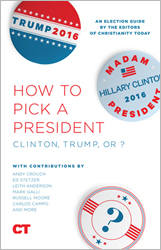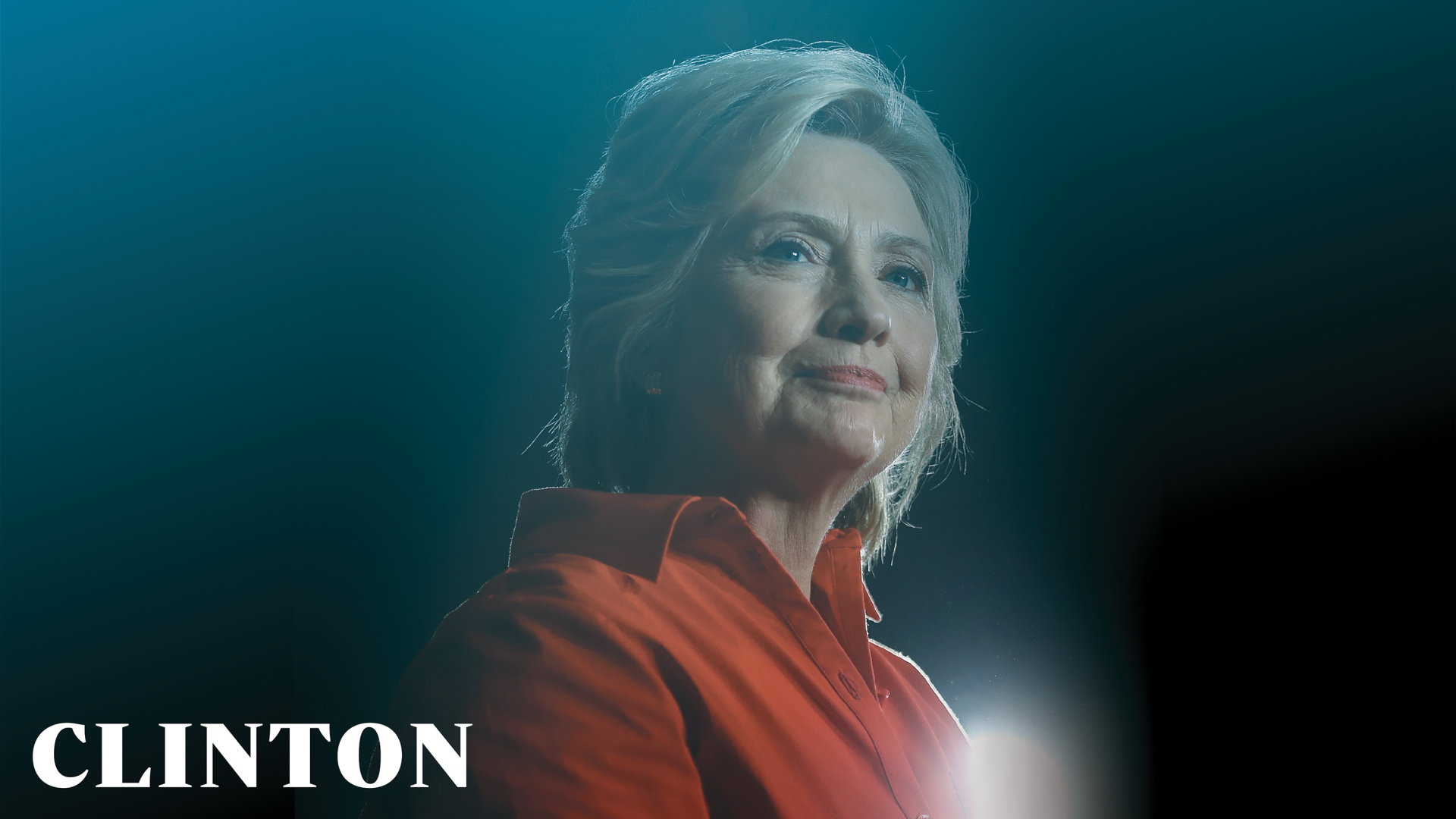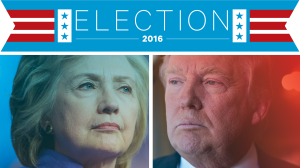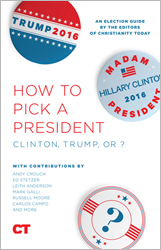In this series

I have not publicly endorsed a presidential candidate in 44 years. But this year—the most important presidential election in my lifetime—I feel compelled to do so.
For decades I have advocated a completely pro-life agenda: pro-life and pro-poor; pro-family and pro–racial justice; pro–sexual integrity and pro-peacemaking and pro–creation care. This agenda is expressed in the National Association of Evangelicals’ public policy document “For the Health of the Nation.”
For decades, as I applied this agenda, I regularly concluded that Republican presidential candidates were better on issues like abortion, marriage and family, and religious freedom, while Democratic candidates were better on racial justice, economic justice, and the environment. So I have voted for both Republicans (George W. Bush) and Democrats (Barack Obama).
But 2016 is astonishingly different from other election years. Hillary Clinton is bad and good in the usual ways. But Donald Trump is not only bad in many of the usual ways—he is also bad in the ways in which I have usually preferred Republicans.
 See our new election book, How to Pick a President
See our new election book, How to Pick a PresidentSee our new election book, How to Pick a President
Trump’s recent pro-life stand is not credible. Historically he has supported abortion access, even to partial-birth abortion, and still supports Planned Parenthood, the country’s largest supplier of abortions.
Trump’s personal marriage record is horrendous. He humiliated his first wife by publicly flaunting an affair. He is now in his third marriage, while Clinton has remained with her husband in spite of his despicable behavior.
Trump’s call to ban all Muslims from immigrating to the United States was a fundamental violation of the constitutional protection of religious freedom.
So what about Clinton?
I have major disagreements with her. She and the Democratic platform are wrong on abortion—period. And I disagree with Clinton on gay marriage.
Further, I fear that Clinton will not retain the longstanding right (protected by Presidents Clinton, Bush, and Obama) of faith-based organizations that receive government funding to hire on the basis of their beliefs. She is too close to Wall Street billionaires and made a serious mistake using private email servers as Secretary of State.
But there is also much to like about Clinton. She has a decades-long history of working hard for racial and economic justice. One of her earliest jobs was working as a lawyer at the black-led Children’s Defense Fund to improve the lives of poor children. At a time when racial injustice and mistrust threaten to tear the nation apart, her experience and trust in minority communities is invaluable.
There is much to like about Clinton. She has a decades-long history of working hard for racial and economic justice.
Clinton realizes that lower-income Americans have lost ground in the past 30 years, and has advocated concrete policies to alleviate the growing divide between rich and poor. Her $350 billion college affordability program would help lower-income students afford higher education. Raising the minimum wage to $12 and tax cuts (15%) for companies that share profits with workers would help. Her proposed expansion of health insurance to cover all Americans is surely pro-life.
Clinton has a realistic and just way to pay for these programs. The middle class would get a modest tax cut, while those with annual incomes over $5 million would have a 4-percent tax increase. She has promised to close tax loopholes that allow corporations to avoid their fair share of taxes. Warren Buffett supports Clinton, saying she would help poor working Americans. The independent, bipartisan Committee for a Responsible Federal Budget says Clinton’s plan would not add significantly to the national debt.
Clinton also endorses serious proposals to protect the environment. And in foreign affairs, the former senator and Secretary of State is probably the most knowledgeable and experienced presidential candidate in decades. Global peace urgently requires a US president who is thoroughly familiar with geopolitics and has a judicious track record.
How does Trump compare? Since the only meaningful choice this fall is Clinton or Trump, my evaluation of Trump is an appropriate part of my decision.
Unjust and Destructive
Major parts of Trump’s economic agenda are both morally unjust and economically destructive. Trump proposed lowering the top income tax rate from 39.6 percent to 25 percent—an annual tax cut of $275,000 for the richest 1 percent, including Trump. That is blatant injustice since today, more than 90 percent of all the increase in income in the total US economy goes to the richest 1 percent.
Trump’s economic plans would also be economically disastrous, adding $9.5 trillion to the national debt over ten years. More recent modifications would still add trillions to the national debt. The pro-business US Chamber of Commerce has predicted a recession “within the first year” of a Trump presidency.
Trump promised to expel the approximately 11.3 million undocumented immigrants, millions of whom have children born in this country—who are therefore US citizens. This plan would tear apart millions of families and defies the biblical command to love and care for the “sojourner” (i.e., non-citizen). Deporting 11 million people would cost $400 billion to $600 billion. And because there are not enough workers here to replace the roughly 6.8 million employed undocumented workers, the economy would decline by an estimated $1 trillion.
Trump grossly distorts facts and makes ridiculous promises. He said the United States is “the highest taxed nation in the world.” Economists show the United States is nearly the least-taxed (32nd out of 34th) of all industrialized nations. His repeated promise to make Mexico pay for his border wall is flatly absurd.
Trump said the judge in charge of the legal case against Trump University should be disqualified because he is “Mexican”—a “textbook” case of racism, said Republican Speaker of the House Paul Ryan. Trump has called Mexican immigrants “rapists” and “criminals.” Russell Moore, president of the Southern Baptist Convention’s public policy commission, has sharply condemned Trump’s “not-so-coded messages denouncing African Americans and immigrants.”
Trump has said that “torture works” and that he would “bring back waterboarding and a hell of a lot worse than waterboarding.” He has called for killing the families, even children, of terrorists—which is a war crime under both US and international law.
Prominent evangelicals condemn Trump. Max Lucado has never before publicly commented on presidential candidates but this year wrote of Trump: “He ridiculed a war hero. He made a mockery of a reporter’s menstrual cycle. He made fun of a disabled reporter.” “His attitude toward women is that of a Bronze Age warlord,” says Moore. Peter Wehner, who served in the past three Republican administrations, denounces Trump as a “moral degenerate” and “comprehensive and unrepentant liar.”
Do we evangelical Christians trust Donald Trump to be a wise statesman leading the world to avoid conflict and war?
Trump’s boasting is breathtaking. Some of his recent comments: “Nobody’s ever been more successful than me.” He said he had studied the Iran deal “in great detail, greater by far than anyone else.” “Nobody knows more about taxes than I do, maybe in the history of the world.” “No one reads the Bible more than me.” One final example: “Nobody is better on humility than me.” Yet Trump has said he has never asked God for forgiveness because he doesn’t need it.
We Need a Wise Statesman
Do we evangelical Christians trust Donald Trump to be a wise statesman leading the world to avoid conflict and war? The US president is the leader of the democratic world and the commander of the world’s largest military. A wise, thoughtful president who listens carefully to the best-informed advisers is essential if the United States and China are to avoid catastrophic conflict in the next decade or two.
Trump has absolutely no experience in foreign affairs or global diplomacy. He has repeatedly demonstrated arrogant, impulsive decision making. I can’t trust him to control the nuclear trigger. In August, 50 of the nation’s most senior Republican national security officials issued a public letter saying Trump “lacks the character, values, and experience” to be president, and added that Trump “would be the most reckless president in American history” and would “put at risk our country’s national security.”
Voting for one candidate rather than the other does not mean that one endorses all that candidate supports. It simply means that one believes the other candidate would lead to worse results.
And in 2016, there are only two meaningful choices: Trump and Clinton. One could vote for the Libertarian or Green Party candidate, but they have no chance of winning. Voting for them, or writing in someone else, will only help elect Trump.
In this unprecedented, astonishing presidential election, I have no doubt that voting for Hillary Clinton is the right choice.
Ron Sider is founder and president emeritus of Evangelicals for Social Action and a distinguished professor at Palmer Seminary at Eastern University. Title and institutional affiliation are only supplied for identification purposes and do not represent the views of Eastern University.













